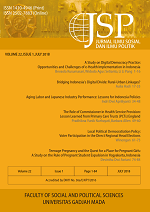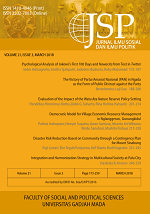'Good Governance' dan 'Governability'
https://doi.org/10.22146/jsp.11043
- Pratikno
(1*)
(1) Universitas Gadjah Mada
(*) Corresponding Author
Abstract
The article endeavors to trace the outset of governance concept, its dominant meanings and discourse, and its implication towards governability. The central role of government in the governing processes has predominantly been adopted. The concept of governance was emerged precisely in the context of the failure of government as key player in regulation, economic redistribution and political participation. Governance is therefore aimed to emphasize pattern of governing which are based both on democratic mechanism and sound development management. However, practices of such good governance concept –which are mainly adopted and promoted by donor states and agencies– tend to degrade state and/or government authority and legitimacy. Traditional function of the state as sole facilitator of equal societal, political and legal membership among citizens has been diminished. The logic of fair competition has been substituted almost completely by the logic of free competition in nearly all sectors of public life. The concept and practices of good governance have resulted in decayed state authority and failed state which in turn created a condition for "ungovernability". By promoting democratic and humane governance, the article accordingly encourages discourse to reinstall and bring the idea of accountable state back in.
Keywords
Governance; good governance; democratic governance; humane governance; pembangunan; kapasitas negara
DOI:
https://doi.org/10.22146/jsp.11043
Article Metrics
Abstract views : 12008
|
views : 67316
Refbacks
There are currently no refbacks.
Copyright (c) 2016 Jurnal Ilmu Sosial dan Ilmu Politik
<div class="statcounter"><a title="Web Analytics" href="http://statcounter.com/" target="_blank"><img class="statcounter" src="//c.statcounter.com/10932543/0/2e122c85/0/" alt="Web Analytics"></a></div> <div class="statcounter"><a title="Web Analytics Made Easy - StatCounter" href="http://statcounter.com/" target="_blank"><img class="statcounter" src="//c.statcounter.com/10932543/0/2e122c85/0/" alt="Web Analytics Made Easy - StatCounter"></a></div> View My Stats






















